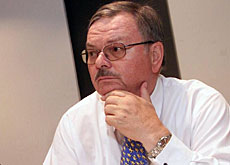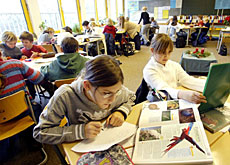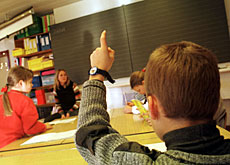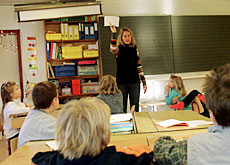Chaos fears loom over spelling row

Switzerland says it wants to press ahead with controversial new German spelling rules.
In an interview with swissinfo, Hans Ulrich Stöckling, the head of the country’s educational authorities, expressed concern that a split over the changes could lead to confusion in schools.
Two influential publishing houses in neighbouring Germany said earlier this month that they would abandon the new writing style introduced six years ago.
In Switzerland conservative political parties and several authors have stepped up their opposition to the reforms in the wake of the announcement.
The latest revolt comes just one year before the changes are due to be made binding for schools and government documents.
The rules break up some of German’s notoriously long words, eliminate excessive commas, and simplify spelling.
Experts from eight European countries, including Switzerland, are due to meet in Austria later this month to discuss ways of defusing the crisis, which has taken on political dimensions.
swissinfo: The controversial reform has regularly sparked criticism over the past six years, usually at the start of a new school term. Is the latest row just another storm in a teacup?
Hans Ulrich Stöckling: Possibly. But I find it absurd that important publishing houses in Germany, such as the Axel Springer and the Spiegel-Verlag, are setting themselves up as guardians of the German language.
Those two publishers have never been known as models when it comes to the correct spelling of words in recent years.
swissinfo: To what extent is the row also of interest to non-German-speaking countries?
H.U.S.: It is of lesser interest to them than to Germany, I guess. Differences between the old and the new spelling rules are also not very noticeable in everyday use in Switzerland, apart from a few exceptions.
More than 90 per cent of all the changes concern words which the average Swiss citizen has not been able to spell correctly anyhow. This is different in Germany, because some changes are much more visible, in particular the double “s”, or ß.
swissinfo: Who would suffer most in Switzerland if the new rules were ditched?
H.U.S.: Obviously the language itself would suffer and then, of course, it would affect teaching. Rules set by an authority only apply to schools, exams and courses.
Teachers have to be able to rely on binding rules in case of an appeal against exam results. The spelling reform also affects official documents, but apart from that everybody is free to write the way they like.
swissinfo: Is the row likely to adversely affect the teaching of foreign languages in Switzerland – a country proud of its multilingual heritage?
H.U.S.: I don’t think that the dispute has an impact on foreign-language teaching in Switzerland. Changes will, for the most part, not be of crucial importance to German-language classes for non-German speakers. They never have been.
swissinfo: Are you concerned about possible costs for the already financially strapped authorities if the reform were abandoned?
H.U.S.: I’m not concerned about costs if it’s possible to find a convincing new solution. Changes can be introduced gradually.
It is clear that the publishers of the standard reference book, Duden, would benefit if the reforms were ditched: people would have to buy new editions of the book.
swissinfo: In Germany the debate has taken on a political dimension. Do you expect something similar to happen in Switzerland?
H.U.S.: I believe that it’s up to academics to lay down the rules, and not the job of politicians. The spelling reform should be kept away from the hands of politicians.
It’s peculiar to see that in Switzerland conservative political parties and authors who have a reputation of leaning to the Left, have become bedfellows on the language issue.
I can’t understand the opposition coming from the authors. Their role is to contribute to the development of the language. They always made their own rules in the past and will do so in future too.
swissinfo: Was it not simply a mistake to introduce new rules to replace the old spelling six years ago?
H.U.S.: I haven’t been a fervent supporter of all the changes myself. I even called for a halt to the reforms at the time. But ultimately it’s the schools which need clear rules.
swissinfo: Experts from countries where German is spoken are due to meet on August 23 in Austria to find ways to settle the dispute. What is a small country like Switzerland hoping to achieve in Vienna?
H.U.S.: Switzerland and Austria will push for a proposal to continue with the new spelling style. But unfortunately the situation in Germany is more complex. The heads of government of the Länder [states] have the right to interfere in matters of their education ministers.
In the past it was not the size of country which counted, but whether the case it made was convincing.
swissinfo: What possibilities does Switzerland have to opt out if other countries decide to ditch the spelling reform?
H.U.S.: We have had this possibility and have used it in the past. The spelling of certain words in Switzerland is considered correct, while they would be seen as erroneous in Germany.
swissinfo: What do you think of the proposal to let the people decide the issue?
H.U.S.: That’s nonsense. But I agree that it is important to keep the issue away from politicians and let the academic world decide.
swissinfo-interview: Urs Geiser
Switzerland is predominantly German-speaking (about 64%), although Swiss variations are used.
French is spoken by nearly 20% of the population.
Other minority languages include Italian (6.6%), Romansh (0.5%), while 9.5% speak other non-official Swiss languages.
The reform, which began 20 years ago, is aimed at simplifying the spelling of German, but opposition against it has never ceased.
In August 1998 Germany, Austria, Switzerland and five other countries introduced new spelling rules for German.
The old spelling rules will become obsolete as of August 2005.

In compliance with the JTI standards
More: SWI swissinfo.ch certified by the Journalism Trust Initiative




You can find an overview of ongoing debates with our journalists here. Please join us!
If you want to start a conversation about a topic raised in this article or want to report factual errors, email us at english@swissinfo.ch.